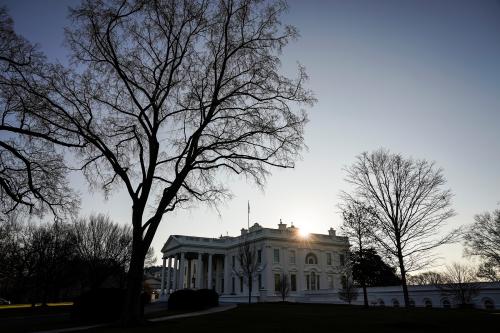Following the Senate’s resolution of disapproval of the emergency declaration to build a southern border wall, Brookings scholars had differing opinions on what it will mean for President Trump. In addition to what John Hudak writes below, you can read a separate piece by Elaine Kamarck arguing that this does have implications for the president’s vulnerability to impeachment.
Yesterday, the U.S. Senate joined the House in passing a resolution disapproving President Trump’s Emergency Declaration to build a wall along the U.S.-Mexico border. The resolution—H.J. Res. 46—faces certain veto from the president, which will not be overridden; the House fell 45 votes short and the Senate fell eight votes short of a veto-proof majority. Although many, including my colleague Elaine Kamarck, see this as a striking rebuke for President Trump from several of his own partisans in Congress, there are multiple silver linings for the president.
First, Mr. Trump won in his battle with Congress over his emergency declaration. Opponents of the declaration could not convince Republicans to cross the aisle and vote for the resolution (and against the emergency) in sufficient enough numbers to override the veto. This sustains the emergency and will be more evidence for the courts that the political processes have been exercised and while Congress had the opportunity to cancel the emergency, it did not.
Second, Mr. Trump showed the strength of his position and the power of his popularity within the party. Although the president has endured historically low approval ratings during his first 26 months in office, he remains extraordinarily popular among Republicans. A recent Gallup poll shows Mr. Trump with a 39-percent approval rating nationally, but a 90-percent approval rating among Republicans. And even though Mr. Trump’s decision to declare a national emergency remains unpopular with the general public (61 percent oppose it according to NPR/PBS polling from February), fully 85 percent of Republicans support the declaration. This has put Republicans in a difficult position over wall construction and the emergency declaration: oppose the popular leader of the party and fellow Republicans, or oppose the will of the general public? In that battle, President Trump emerged victorious and Congressional Republicans voted with their base.
Third, the Congress telegraphed a very clear message to Mr. Trump: if Democrats talk about impeachment, worry not; you’re not going anywhere. Over the past few months, my colleague Elaine Kamarck has been head-counting the several pieces of legislation that have been (rightly) viewed as a rebuke of the president. Rebukes include: the vote on Russian sanctions, the failure to repeal Obamacare, reactions to the Putin summit, and withdrawal of troops from Afghanistan and Syria. They have provided interesting insight into which Republicans are willing to vote against the president, how many of them there are, and when they are willing to take that step. However, I argue too much stock is put into that headcount. Let’s zoom out a little bit to understand why.
The decision to vote to convict a president in an impeachment trial is among the most monumental decisions a senator could take—especially a senator from that president’s party. A sufficient number has never been amassed to remove a president from office. (Although, if Richard Nixon had not resigned from office, his removal was all but certain.) Such a move would be ultimate defiance of a president and the partisans in the electorate who support him. Senate Republicans showed us yesterday that they could not even muster a two-thirds majority to condemn a wildly unpopular presidential directive. If those Senators could not muster the will to slap Mr. Trump on the wrist, why should we think they would hand him the presidential politics version of a death sentence?
The reality is that the president is far too popular to be removed from office, and Senate Republicans recognize that their political future is tied to Mr. Trump’s. As I have written elsewhere, right before Richard Nixon’s resignation, his approval dropped to slightly under 50 percent among GOP voters. Mr. Trump is quite far from that threshold. And what’s more, Mr. Nixon did his party a favor and exited gracefully from the presidency, ensuring that those 42 Republican senators were not forced to cast a vote that may have been right for the country but anger half of the party’s voters. We have no idea how Senate Republicans would have fared in future elections had they voted to remove the president.
One then has to wonder: in a similar situation, would Mr. Trump bow out gracefully or hold his party’s feet to the fire? And facing a standoff with voters in their own party, would these senators roll the dice and stick with the president? I would assume the latter—no matter the other headcounts.










Commentary
The Senate’s emergency vote showed Trump’s enduring strength
March 15, 2019